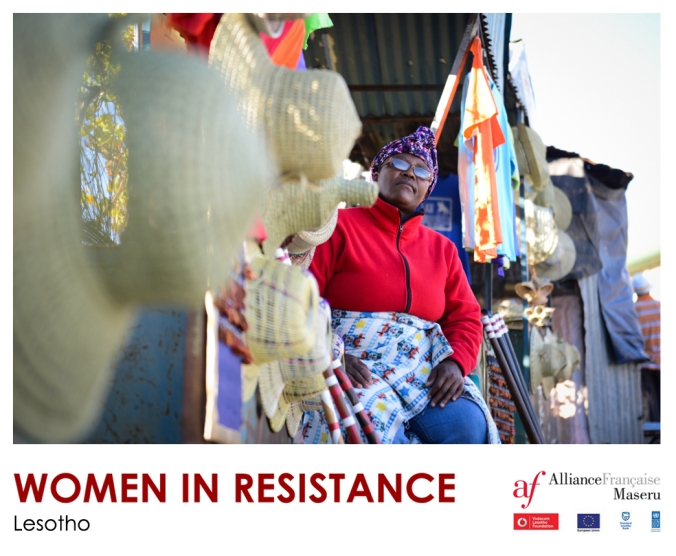
Photo © Meri Hyöky / Text by Leila Hall
For the past thirty years, ‘Mateboho Lerotholi has worked as a street vendor at the Maseru Bridge Border Post. In 1985, as a high school student, she would come to the Border Post after school to help her aunt, who also worked as a street vendor. Now, at the age of 47, Lerotholi sits at a small stall and sells grass hats, brooms, t-shirts and jewellery to passers by.
“This is not an easy job,” she says. “It gets extremely cold in the winter. I suffer from arthritis. When it rains, I can’t come to work at all. Sometimes, in December or at Easter, I spend the whole night here to try and make a bit of extra money.”
Lerotholi is one of the founding members of Khatang Tema Baits’okoli, a street vendors’ association that was formed in 2002.
“Five hundred of us came together to form the association. Our aims are to protect our members and to help and support each other as street vendors. Every month, we help one of our members to improve their business.”
Khatang Tema Baits’okoli is now a member of StreetNet International, a global alliance that brings together street vendors’ associations from around the world and promotes the exchange of information, ideas and advocacy strategies.
“StreetNet International organises exchanges, to help us find out what life is like for street vendors in other countries. I have travelled to Colombia for an exchange, and colleagues of mine have travelled to countries such as Tunisia, Chile and Brazil.”
“In Colombia, the government does a lot to support street vendors. They have big markets: buildings with proper covering, toilets and water. This is what we need in Lesotho. Street vendors here have no shelter, no toilets, no water. When it rains, we have no protection.”
“I wish the government of Lesotho would support us by putting up shelters that would protect us from the rain and the cold. We would even be willing to pay rent for such a place. We ask for nothing from the government. We are self-sufficient, we do everything for ourselves.”
“I’m good at organising people, at bringing people together. I’m a member of a women’s association – a stokvel – that helps us to save money. With this money, I’ve been able to build my own house. My husband and I divorced, but when he left I kept going. I live alone now with my two children. I pay for their school fees with the money that I earn on the street. I’ve never worked anywhere else.”
“People need to respect women who are street vendors. When people see us on the streets, they don’t realise that we are able to take care of ourselves and raise families. We are business-minded; we have good plans and ideas. We are strong, we ask for nothing from anybody else.”
“There are many things that we can do as women. By coming together and putting our money together, we are able to help one another. When you are alone, you can’t do anything, but together we are able to push each other forward in life.”